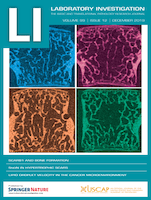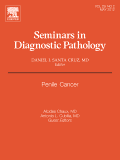
AMERICAN JOURNAL OF PATHOLOGY
Scope & Guideline
Leading the Way in Pathological Discoveries Since 1946
Introduction
Aims and Scopes
- Disease Mechanisms and Pathogenesis:
The journal publishes studies that elucidate the underlying mechanisms of diseases, particularly focusing on cellular and molecular pathways that contribute to pathogenesis. - Diagnostic Pathology:
AJP emphasizes the development and application of diagnostic methodologies, including histopathology and the use of advanced imaging techniques, to improve disease detection and classification. - Translational Research:
The journal bridges laboratory research and clinical applications, promoting studies that translate findings from basic science into clinical practice to enhance patient care. - Innovative Therapeutics:
AJP highlights novel therapeutic strategies, including drug development and genetic interventions, that target specific pathways in disease processes. - Emerging Technologies in Pathology:
The journal covers advancements in technology, such as artificial intelligence and machine learning, that enhance diagnostic capabilities and improve the understanding of disease progression.
Trending and Emerging
- Artificial Intelligence and Machine Learning:
The integration of AI and machine learning in pathology is rapidly growing, with an emphasis on automating image analysis and improving diagnostic accuracy. - Microbiome Research:
There is an increasing focus on the role of the microbiome in various diseases, highlighting its impact on pathogenesis and therapeutic responses, particularly in gastrointestinal and metabolic disorders. - Immunopathology and Inflammation:
Research exploring the immune response and its role in disease progression, especially in the context of COVID-19 and autoimmune diseases, is gaining prominence. - Targeted Therapies and Personalized Medicine:
Studies focusing on targeted treatments and personalized medicine approaches are on the rise, reflecting advancements in understanding genetic and molecular disease mechanisms. - Environmental and Lifestyle Factors in Disease:
Research exploring the impact of environmental exposures, diet, and lifestyle on disease susceptibility and progression is emerging as a significant area of interest.
Declining or Waning
- Traditional Histopathology Techniques:
There has been a noticeable decrease in publications centered solely on traditional histopathology methods, as the field increasingly incorporates digital pathology and computational techniques. - Basic Histological Studies:
Research that primarily focuses on basic histological descriptions without integrating modern molecular or genetic insights appears to be waning, as the field moves towards more comprehensive analyses. - Non-Translational Studies:
Studies that do not connect laboratory findings with clinical implications are less frequently published, indicating a growing emphasis on translational research that directly impacts patient outcomes. - Single Disease Focus:
There is a trend away from studies that focus exclusively on a single disease entity, as researchers increasingly adopt interdisciplinary approaches that consider multiple diseases or conditions in a broader context.
Similar Journals

MODERN PATHOLOGY
Innovating Diagnostic Excellence in PathologyMODERN PATHOLOGY is a premier journal in the field of pathology and forensic medicine, published by Elsevier Science Inc. With an impressive impact factor that places it in the top 1st quartile (Q1) for 2023, and a remarkable rank of 5 out of 208 in its category according to Scopus, it serves as a vital resource for researchers, professionals, and students alike. Established in 1988, the journal focuses on the latest advancements in diagnostic pathology, molecular pathology, and related fields, providing a platform for innovative research that drives the discipline forward. Although it does not operate under an open access model, readers can expect rigorously peer-reviewed publications that contribute to the growing body of knowledge in pathology. With a continuous commitment to excellence and relevance, MODERN PATHOLOGY remains a fundamental avenue for disseminating high-quality scientific research globally, facilitating the growth and development of its field.

VETERINARY CLINICAL PATHOLOGY
Bridging gaps in veterinary science with rigorous scholarship.Veterinary Clinical Pathology, published by Wiley, stands as a crucial resource within the realm of veterinary science, particularly focusing on the intricate field of clinical pathology. Established in 1977, this journal has been at the forefront of advancing knowledge and research, with a converged publication timeline stretching to 2024. With an ISSN of 0275-6382 and an e-ISSN of 1939-165X, it is recognized for its rigorous contributions to the field, achieving a commendable Scopus rank of #87 in General Veterinary, placing it in the 55th percentile among its peers. While it operates under a subscription model, its impact is underscored by its Q2 ranking in the Veterinary category and Q3 in the broader Medicine category for 2023. As a platform for researchers, professionals, and students alike, Veterinary Clinical Pathology aims to disseminate significant findings, foster interdisciplinary collaboration, and enhance the understanding of pathophysiological processes in animals, ultimately contributing to better clinical outcomes and animal health management.

Malaysian Journal of Pathology
Transforming understanding of disease through original research.Malaysian Journal of Pathology, published by the MALAYSIAN JOURNAL PATHOLOGY, stands as a pivotal resource in the fields of pathology and medicine, contributing rich insights since its inception in 1979. This peer-reviewed journal, based in Malaysia, is dedicated to disseminating original research, review articles, and case studies that advance the understanding of disease mechanisms and diagnostics. With a current impact factor reflecting its ranked positioning—Q4 in Cell Biology, Q4 in Histology, and Q3 in both Miscellaneous Medicine and Pathology & Forensic Medicine—this journal serves as an essential platform for researchers, clinicians, and students alike. Although it operates without open access, its scholarly rigor and contributions are well recognized, holding ranks such as #84 in Pathology and Forensic Medicine according to Scopus. The Malaysian Journal of Pathology is committed to fostering innovation and excellence in medical research, making it an invaluable tool for professionals seeking to stay abreast of significant advancements in the pathology domain.

HISTOPATHOLOGY
Elevating Research in Forensic Medicine and DiagnosticsHISTOPATHOLOGY is a premier scholarly journal published by WILEY, targeting the fields of histology, pathology, and forensic medicine. With an ISSN of 0309-0167 and an E-ISSN of 1365-2559, this esteemed journal has maintained a strong academic presence since its inception in 1977. Boasting an impressive Q1 ranking in crucial categories such as Histology and Pathology, it ranks 13th out of 208 in Pathology and Forensic Medicine, and 5th out of 62 in Histology, reflecting its high impact and relevance within the scientific community. HISTOPATHOLOGY serves as a critical platform for disseminating significant research findings, reviews, and advancements in the diagnostic and therapeutic aspects of pathology. Although it does not operate under an open access model, its rigorous peer-review process ensures that published articles uphold the highest standards of scientific integrity. Scholars and practitioners alike benefit from the insights shared in this journal, as it aims to bridge the gap between laboratory science and clinical practice, fostering innovation and enhancing our understanding of disease mechanisms.

LABORATORY INVESTIGATION
Exploring Innovations in Pathology and BeyondLaboratory Investigation is a premier academic journal published by Elsevier Science Inc, specializing in the fields of Pathology, Forensic Medicine, Cell Biology, and Molecular Biology. With its ISSN 0023-6837 and E-ISSN 1530-0307, this journal has been a significant contributor to scientific discourse since its inception in 1952, converging into its current form by 2024. It holds an impressive standing in its respective fields, featuring a 2023 Journal Rank of Q2 in both Cell Biology and Molecular Biology, and an elite Q1 ranking in Pathology and Forensic Medicine, reflecting its influence and quality of research, as seen in its Scopus ranks—17th out of 208 in Pathology and Forensic Medicine. Although it does not offer Open Access options, the journal remains a vital resource for researchers, professionals, and students who seek to disseminate and engage with high-caliber research findings. The importance of Laboratory Investigation is underscored by its commitment to advancing the understanding of laboratory and translational medicine, paving the way for innovations that enhance clinical practices.

PATHOLOGY RESEARCH AND PRACTICE
Advancing the Frontiers of Pathological SciencePATHOLOGY RESEARCH AND PRACTICE is a premier journal in the field of pathology and forensic medicine, published by Elsevier GmbH in Germany. With a rich publication history since 1978 and an impressive convergence period extending to 2024, this journal serves as a vital resource for researchers and professionals dedicated to advancing the understanding of pathological processes. It holds notable rankings, including Q3 in Cell Biology and Q2 in Pathology and Forensic Medicine for 2023, reflecting its significance in the academic community. The journal aims to publish innovative research findings, reviews, and case studies, facilitating a deeper understanding of disease mechanisms and improving diagnostic practices. Authors and readers alike benefit from its reputable platform, noted for its challenging and rigorous peer-review process. By fostering a collaborative environment and providing open access options, PATHOLOGY RESEARCH AND PRACTICE continues to contribute meaningfully to the discourse within its respective fields, thereby appealing to a diverse audience of researchers, professionals, and students.

HISTOLOGY AND HISTOPATHOLOGY
Connecting Researchers to Groundbreaking DiscoveriesHISTOLOGY AND HISTOPATHOLOGY, published by F HERNANDEZ, is an esteemed academic journal dedicated to advancing the fields of histology and pathology. With its ISSN 0213-3911 and E-ISSN 1699-5848, this journal has been a crucial resource for researchers and professionals since its inception in 1986. The journal enjoys a strong reputation, evidenced by its Q2 category rankings in both Histology and Pathology & Forensic Medicine as of 2023, positioning it within the top tier of scholarly publications. With Scopus rankings placing it at Rank #74/208 in Medicine - Pathology and Forensic Medicine and Rank #31/62 in Medicine - Histology, it proves to be an essential platform for disseminating significant research findings and innovations. Although the journal is not open access, it is committed to providing high-quality, peer-reviewed articles that cater to the needs of its academic community. With a focus on fostering a deeper understanding of tissue structure and disease mechanisms, HISTOLOGY AND HISTOPATHOLOGY serves as an indispensable resource for students, researchers, and practitioners alike, facilitating the exchange of knowledge and pioneering research in these vital areas of study.

SEMINARS IN DIAGNOSTIC PATHOLOGY
Leading the way in pathology innovation.Seminars in Diagnostic Pathology is a premier journal that has established itself as an essential resource in the field of pathology since its inception in 1984. Published by W B Saunders Co-Elsevier Inc, this journal boasts an impressive Q1 ranking in the pathology category for 2023, placing it in the top tier of medical journals worldwide. With a focus on diagnostic pathology, it offers a platform for groundbreaking research and advancements that bridge the gap between basic science and clinical practice. The journal is committed to publishing high-quality review articles, case reports, and expert opinions that provide valuable insights for professionals, researchers, and students alike. Although it operates on a subscription model, the journal's extensive impact is reflected in its Scopus rank (#56/208), with a remarkable 73rd percentile standing in the pathology and forensic medicine category. The journal's authoritative content not only aids in enhancing knowledge but also fosters an understanding of the evolving challenges and methodologies in diagnostic pathology, making it an indispensable tool for anyone dedicated to excellence in the field.

INTERNATIONAL JOURNAL OF EXPERIMENTAL PATHOLOGY
Connecting Scientists to Transform Pathological UnderstandingINTERNATIONAL JOURNAL OF EXPERIMENTAL PATHOLOGY, published by Wiley, is a leading peer-reviewed journal dedicated to the field of experimental pathology. With an ISSN of 0959-9673 and E-ISSN 1365-2613, the journal has been a vital resource for researchers and professionals since its inception in 1990, covering a broad spectrum of topics within pathology, cell biology, and molecular biology. The journal's relevancy is underscored by its Q2 ranking in Pathology and Forensic Medicine and Q3 rankings in both Cell Biology and Molecular Biology, as of 2023, reflecting its significant contribution to the scientific community. Although it does not currently offer open access options, readers can benefit from its insightful research articles and reviews that guide advancements in diagnostic pathology and therapeutic strategies. As the journal continues to evolve, it remains committed to facilitating the exchange of innovative ideas and findings that drive progress in experimental pathology and related fields, making it an indispensable platform for scientists, clinicians, and students alike.

ENDOCRINE PATHOLOGY
Advancing the Future of Endocrine ResearchENDOCRINE PATHOLOGY is a premier journal published by HUMANA PRESS INC, dedicated to advancing the understanding of endocrine disorders through innovative research and clinical practices. With an impressive impact factor and consistently ranked in the Q1 quartile across multiple categories such as Endocrinology, Diabetes and Metabolism, as well as Pathology and Forensic Medicine, this journal serves as a pivotal resource for researchers and professionals in the field. The journal covers a broad spectrum of topics related to endocrine pathology, providing insights into mechanisms, diagnostics, and therapeutics that inform both clinical and laboratory practices. Although it does not offer open access, its rigorous peer-review process ensures the dissemination of high-quality, impactful research that shapes clinical strategies and enhances patient care. With distribution spanning from its inception in 1990 to 2024, ENDOCRINE PATHOLOGY stands at the forefront of endocrine research, making it an essential read for anyone involved in the study and treatment of endocrine disorders.